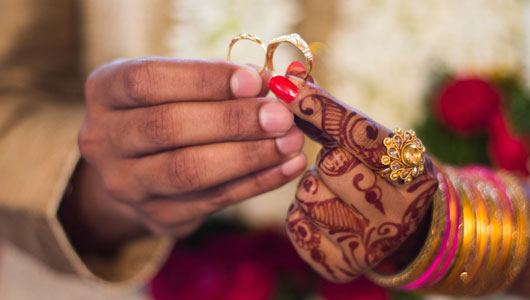
Arranged Relationships
Think arranged marriages sound like a throwback to an era of mail order brides? Believe it or not, arranged relationships are still common in many countries -- in fact, over half of all marriages worldwide are arranged.
Though they may seem like vestiges of a pre-feminism era, arranged marriages are changing with the times. Why do people have arranged relationships, and are they better than love matches? Can you be happy in an arranged marriage? Let's take a deeper dive into the topic of these unique relationships and find out.
What Is An Arranged Relationship?
In an arranged relationship, two people are chosen by their families to marry and become life partners. The parents choose who will marry whom based on factors such as religion, culture, social status, and financial stability. In some arranged marriages, the couple meet and fall in love, but don't proceed with a relationship or marriage until their families agree.
Why Do People Have Arranged Relationships?
People have gotten married through arranged relationships for centuries. Today, there are still places where arranged marriage is very common. For example, in India, the Middle East, and Orthodox Judaism, arranged marriages are still quite popular. Arranged marriages are typically part of a culture's custom, with a long history of tradition and ritual around the engagement and ceremony.
Arranged Marriage Vs. Love Marriage
An arranged marriage is different from a love marriage in many ways. Some of the most common examples of these differences include:
- Family involvement. While many marriages for love do involve the couple's families, arranged marriages take family to a whole new level. Parents and extended family can be part of all aspects of the relationship, from first meeting to engagement to life after the ceremony.
- Divorce rate. Arranged marriages may sound like a recipe for unhappiness, but they are surprisingly successful. Half of all marriages in the US end in divorce, while the arranged marriage divorce rate is an extremely low 4%.
- Mindset. While some partners in arranged marriages are resistant to the arrangement, many have expected an arranged marriage since they were children. Their culture and family is based around these relationships, which are familiar and widely accepted. They may believe that love grows in marriage over time, and view the relationship as a way to bring families together and create stability. By contrast, a love marriage is often approached as a way to fulfill both partner's needs for companionship, sex, and love. Family may or may not be involved, and expectations are generally different.
- Children. Many marriages are arranged with the purpose of childrearing, making having children a main focus of the relationship. In Western countries where arranged marriages are uncommon, birth rates tend to be lower, and more married couples are foregoing having children altogether.
- Dating. When a marriage is arranged, dating may be almost eliminated in favor of a match chosen and approved by family members. This can make the process of finding a partner much simpler and easier. Finding a mate for marriage based on love may take tremendous effort, including introductions by friends, meeting people online through dating apps, or at bars or parties.
Benefits Of Arranged Marriage
Arranged marriages aren't for everyone, and may sound misogynistic and old-fashioned to people in many Western cultures. But there can be benefits, including:
- The potential for a better match. Because an arranged marriage takes into account not just attraction but long-term suitability including values, finances, and common background, the match may be more viable over time.
- Higher level of experience of parents. Parents can help guide their children through the process of an arranged marriage and a match based on factors other than love and infatuation. Having the assistance of family can make the experience less stressful, particularly
- Lower risk of divorce. Whether the reasons are better compatibility, societal expectations, values that are more aligned, or greater stigma, divorce is dramatically less common in arranged marriages. Women in societies where arranged marriages are common may also have fewer rights, making divorce more difficult.
- Financial security. Most families take finances into account when choosing partners for an arranged marriage. These types of relationships can create more financial stability for one or both partners, and potentially help both extended families.
- Cultural similarities of partners. Cultural similarities can be a benefit for couples who value certain traditions and touchstones, including family, religion, education, and holidays.
- Rational rather than emotional decision. While feelings between partners are not always absent in an arranged marriage, other considerations often take precedence. This can be helpful when the match is based on factors that strengthen the relationship, such as family bonds, common values, and future goals.
Disadvantages Of Arranged Marriage
There are also potential disadvantages to arranged marriages. These can include:
- Family pressure. There may be a clash between what your family expects and your own desires and needs. Pressure to get married by a certain age, marry within a certain religion or culture, or choose a partner you aren't interested in can cause stress and conflict between family members
- Societal pressure. Even if you don't feel pressured by family members, you may feel pressured by society to conform to certain expectations. Societal pressure may start in childhood,
- The limits of traditional marriage. Many cultures where arranged marriages are common can be less accepting of nontraditional marriage. This can include relationships between gay, nonbinary, and trans people, and other alternative arrangements like polyamory. Even childless marriages may be frowned on in these cultures, where traditional family structures and gender roles are still the norm.
- Potential lack of love. Arranged marriages generally aren't love matches, which can mean the relationship feels more like a friendship or business arrangement. Love may grow over time, or it may not. The love may feel more familial or platonic, or it may develop into a romantic love more familiar to people in countries where arranged marriages are not the norm.
- Less privacy. Family involvement may make an arranged marriage feel private, and can continue long after the ceremony. In many cultures where arranged relationships are common, couples may move in with parents after the marriage and remain there for years, making privacy and a feeling of independence difficult.
